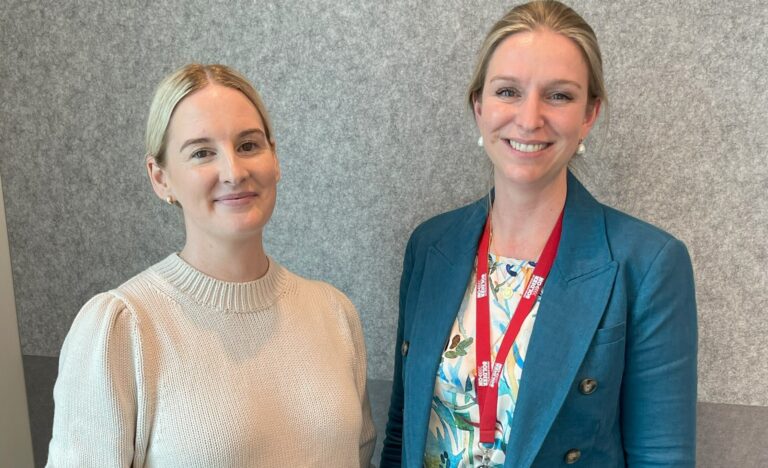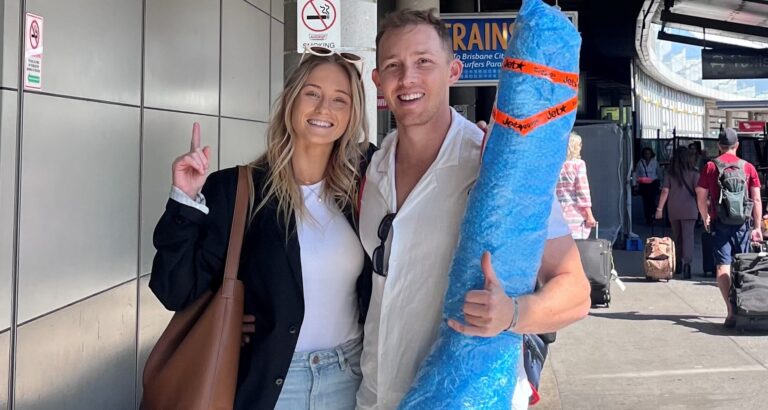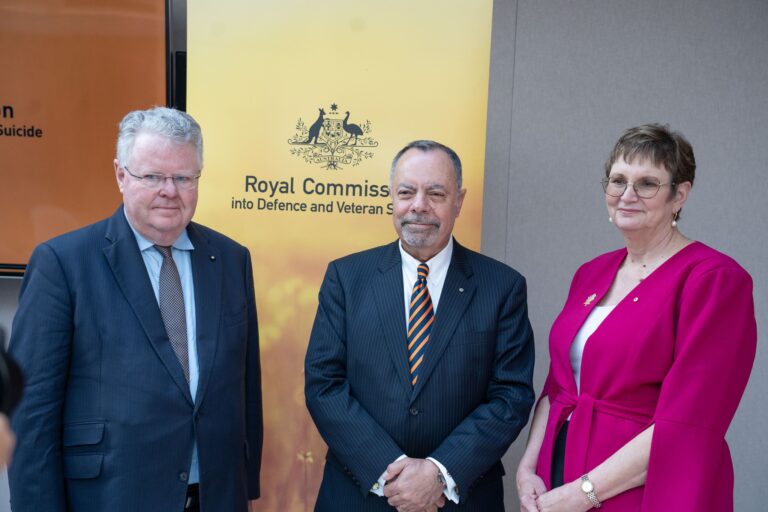Love, compassion and support: Gwen Cherne talks about her mission as Veteran Family Advocate Commissioner
Would you mind sharing a bit about your personal experience as a Defence family member?
As the partner, mother, widow, daughter, granddaughter, niece, and cousin of veterans, many of whom have had distinguished careers, my life has been intricately woven with the tapestry of military service.
Throughout my career, I have traversed the globe, consistently striving to establish stability, offer relief, and create developmental opportunities for families facing crises. My journey led me to spend three impactful years in and out of Afghanistan, engaged in stabilization and reconstruction efforts, working closely with Australian Defence personnel. From 2010 to 2017, I held various roles within the Australian Civil-Military Centre and the Intelligence and Defence Solutions International sector.
The tragic loss of my husband, a veteran, to suicide in 2017 redirected the course of my life. Since then, I have wholeheartedly dedicated myself to advocating for Australian war widows, Defence personnel, and veteran families. My focus has been on championing improved policy design and the implementation of programs and services that mitigate the adverse effects of military service on families. My commitment to achieving better outcomes for these families has only strengthened since my appointment as the Veteran Family Advocate Commissioner.
What does your role as Veteran Family Advocate Commissioner entail? What does it mean to you?
Stepping into the role of Veteran Family Advocate Commissioner, my mission was clear: to amplify the diverse voices resonating within both current serving and veteran communities. The goal was to build a bridge, facilitating the government’s understanding of the experiences and needs of these families, shedding light on the factors influencing their well-being.
In a recent testimony at the Royal Commission into Defence and Veteran Suicide, I sombrely underscored the unfortunate reality that current Defence families continue to grapple with challenges identified as far back as 1986. While the appointment of General Natasha Fox brings a glimmer of hope, there remains a significant amount of work to be done.
The establishment of my position signifies a commitment to acknowledging and addressing the unique needs of veteran families in transition and within the Department of Veterans’ Affairs (DVA). Central to my role is ensuring that families take centre stage in policy design, rather than being an afterthought. I take pride in the increased awareness we’ve achieved regarding these needs, acknowledging the progress made, yet recognising that there is still a considerable distance to cover.
What role does family play in supporting ADF personnel and veterans? How important is this support, in your experience?
Families play a vital role in supporting our serving and ex-serving members not only during their military careers but also long after they hang up their uniforms.
While we may not don military attire or receive grand accolades, families serve in countless ways, often making significant sacrifices. This service, though it may seem ordinary, involves the daily grind—preparing meals, changing sheets, shuttling to sports events, scheduling doctor’s appointments, tending to pets, and performing the mundane yet essential tasks of everyday life. Yet, within this routine lies the extraordinary nature of their service.
The well-being of service personnel is intricately linked to the support and morale provided by their families. These seemingly routine acts contribute significantly to the health and well-being of both serving and ex-serving members. Recent studies emphasise the crucial connection between family morale and the mental health, particularly in terms of suicidality, of veterans.
The bond is reciprocal – if the family’s morale is compromised, the well-being of the serving or ex-serving member is similarly affected, and vice versa.
In the realm of treatment and recovery for ill and injured individuals, families are indispensable. Their role is critical in ensuring the overall well-being and successful rehabilitation of their loved ones.
Why is it important that support for family members from ESOs like Soldier On is becoming more recognised? What is being done well?
During my travels, a recurring sentiment echoes from the voices of those connected to Australian Defence Force service members—they often express not feeling truly part of the veteran family or worse, going unrecognised within our community.
Abby from Melbourne captured this sentiment succinctly, noting, “If you don’t see yourself as part of this community, you won’t feel like you can stand up and fight for your needs.” How accurate that observation is.
It is imperative that we ensure veteran families are not only recognised but also seen, heard, and acknowledged as integral threads in the fabric of our community. The goal should be to provide unwavering support, foster connections, and establish a network of assistance involving government entities, Ex-Service Organisations (ESO), and other community-based providers, with these principles at the core of the services offered.
Organisations like Soldier On play a crucial role in achieving this objective. The commendable work, from walking groups to sausage sizzles, kids clubs to coffee catch-ups, creates social bonds—the foundational elements of community. These initiatives form a nexus where people can gather, and we understand that connection reduces isolation and the risk of suicide. Once these connections are established, accessing support becomes significantly more feasible.
Soldier On’s dedication to providing families with support, stability, and hope during challenging times is invaluable. You empower and enable families to not just survive but thrive.
The recent Defence Strategic Review, unfortunately, failed to mention families even once. The disconnection between our great slogan—’We recruit the individual, we keep the family’—and the absence of family focus in our programs and supports is a notable problem. As a community, we recognise that veterans necessitate unique and specialised services and pathways, yet the same acknowledgment is yet to be fully extended to families. The argument for prioritising strong families is clear, as the well-being of our entire nation is at stake.
Placing families at the centre of our programs, rather than treating them as mere add-ons, is the only way to bring about lasting change.
Soldier On’s vital services fill gaps in an already stretched system, providing much-needed support that veterans and families sometimes struggle to access.
A heartfelt thank you to Soldier On for understanding the profound importance of this mission.
What could be done better in this space more broadly? Are you hopeful there will be some positive outcomes around this from the Royal Commission into Defence and Veteran Suicide?
The Royal Commission into Defence and Veteran Suicide stands as a rare opportunity for transformative change. While reforming government processes and policies is a complex and time-consuming endeavour, with unwavering dedication and concerted effort, we can forge a system where families take precedence.
I firmly believe that State and Territory agencies must actively engage in supporting veteran families. Understanding their demographics is pivotal, and I am actively collaborating with the Department of Veterans’ Affairs (DVA) and these agencies to leverage census data effectively.
It is imperative to simplify and streamline support pathways, ensuring that families, regardless of their location, have access to the tools and information necessary for their well-being.
For many of us, our families serve as the central pillar in our lives, offering love, compassion, and support. Consequently, it is only fitting that families receive dedicated support in return. Without the right assistance, issues can escalate, impacting lives more significantly and incurring higher costs.
Empowering families with the right tools and information is crucial for their well-being. This involves investing in quality programs, services, and support that are accessible across all regions.
Addressing suicide prevention and postvention support, my commitment is to bring support groups and co-designed programs to the forefront. It is crucial that families grappling with the aftermath of suicide receive authentic support, not only to cope with trauma and grief but to foster post-traumatic growth.
As a society, we are progressing in recognising the importance of self-care practices, and current Soldier On programs align precisely with this need. They provide both social connection and opportunities for self-care. The next step involves intentional check-ins to ensure that our social needs are met, particularly for those who have experienced trauma or grief, guiding them on the journey to reconnect with the world.
Our approach must guide families to first heal from trauma, then provide the space for grieving, and ultimately allow for finding meaning and, ideally, growth after trauma or loss. This encompasses not only grief over the loss of a loved one but also the grief associated with the loss of a career, health, relationship, and identity for those living veterans whom Soldier On now supports.
Recognising and addressing domestic violence and intimate partner supports within the context of veteran families is of paramount importance. These issues, often hidden behind closed doors, can have profound and lasting effects on the well-being of those involved.
Understanding the unique challenges faced by veteran families is crucial for creating effective support mechanisms. Domestic violence not only inflicts immediate harm but also undermines the foundation of a healthy and resilient family unit. By acknowledging the prevalence of these issues and fostering an environment that encourages open dialogue, we can begin to break the cycle of silence and stigma.
Providing specialised support for those affected by domestic violence is essential. This includes accessible resources, counselling services, and intervention strategies tailored to the specific needs of veteran families. Recognising the signs of abuse and empowering individuals to seek help without fear of judgment is a critical step in fostering a safe and supportive community.
Moreover, promoting education and awareness about healthy relationships within the veteran community is vital. By cultivating an environment that prioritises respect, communication, and empathy, we contribute to preventing domestic violence and creating a culture of mutual support.
In essence, acknowledging and actively addressing domestic violence and intimate partner supports is not only a moral imperative but also a fundamental step towards building resilient, thriving veteran families. It is a commitment to creating a community where safety, understanding, and support are paramount, ensuring that no one within the veteran family is left to navigate these challenges alone. We have a long road to go to address these problems but the release of the Intimate Partner Violence (IPV) Report by Department of Veterans’ Affairs (DVA) on 29 November 2023 provides crucial insights into IPV within the veteran community. Confronting yet essential, the report will shape tailored programs, including the upcoming DVA Mental Health and Wellbeing Strategy and Family Strategy and marks a significant step towards a safer future.
The significance of partner employment cannot be overstated, as it plays a pivotal role in enhancing overall well-being. Meaningful employment not only provides financial stability but also contributes to personal fulfilment, a sense of purpose, and a positive impact on mental health.
Notably, Australian Defence Force (ADF) and veteran partners bring unique, desirable, and highly employable skills to the workforce. The experiences gained through their association with the military, such as adaptability, resilience, leadership, and problem-solving, make them valuable assets in various professional settings.
However, ADF and veteran partners often face unique challenges in pursuing employment opportunities. The transient nature of the defence lifestyle can limit career opportunities, causing delays in professional advancement. This situation is particularly impactful when partners serve as primary caregivers for children, managing medical appointments, sporting activities, and other familial responsibilities. The commitment to family well-being often requires partners to navigate the intricacies of the military lifestyle, affecting their employment trajectory.
When partners have access to fulfilling work, it not only fosters a sense of accomplishment and self-worth but also leverages the distinctive skills they bring from their military-connected experiences. This, in turn, has a cascading effect on their overall well-being, influencing various aspects of life, including physical and emotional health, family dynamics, and community engagement.
Moreover, partner employment contributes to a more robust and resilient family unit. Financial stability resulting from meaningful work alleviates stressors related to economic uncertainty, creating a healthier environment for both the individual and the family as a whole. It allows families to plan for the future, invest in education, and pursue personal and professional goals, all while bringing the unique skills cultivated within the military community to the broader workforce.
Beyond the individual and family level, the broader community benefits from a workforce that includes engaged and fulfilled partners with a diverse set of skills. Partner employment enhances social cohesion, promotes community involvement, and contributes to the overall economic prosperity of the community.
In recognising the importance of partner employment, we not only acknowledge the economic value it brings but also highlight the challenges faced, particularly regarding limited career opportunities and delays due to the transient nature of the defence lifestyle. Encouraging and facilitating meaningful employment opportunities for ADF and veteran partners is an investment in building resilient, thriving societies where everyone can contribute to and benefit from the collective well-being.
Read more about Gwen on her website.



